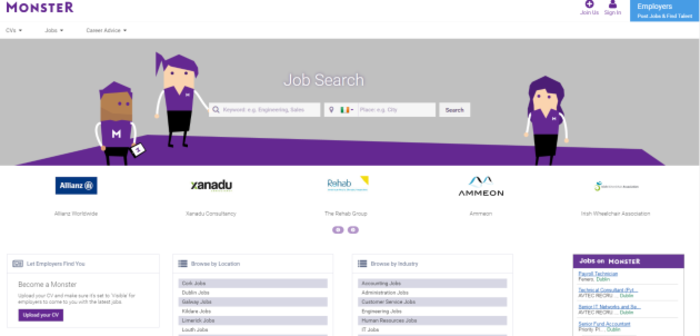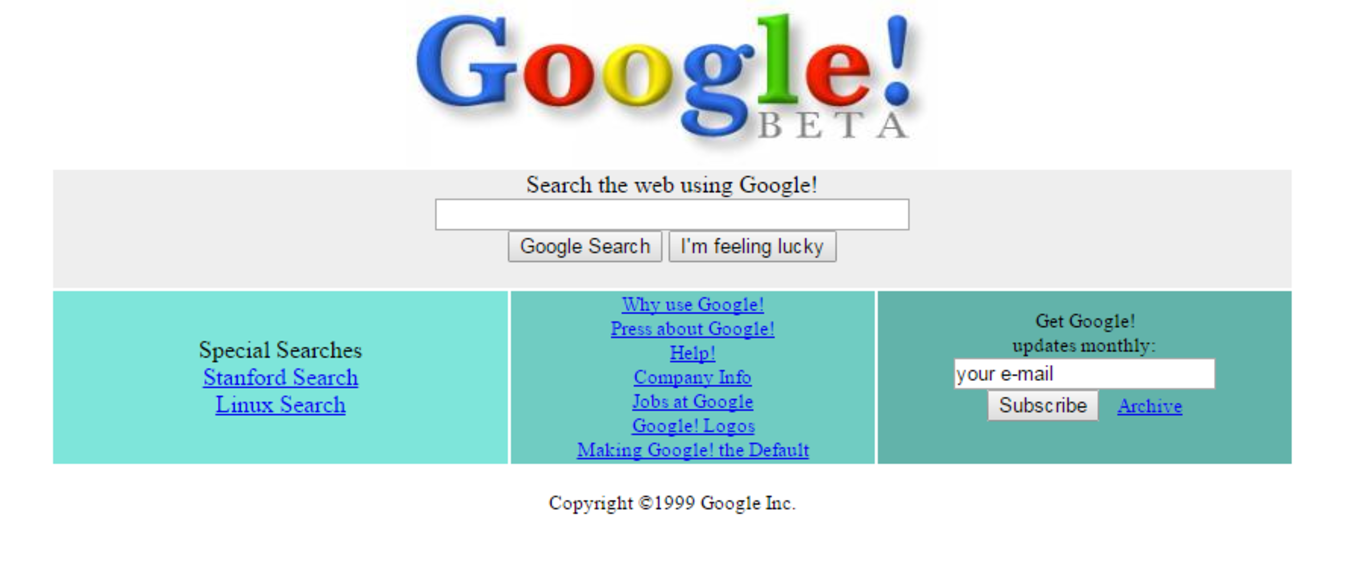Inside the huge Irish jobs website that's older than Google
As part of our weekly How My Business Works series we profile IrishJobs.ie.
AT THE TURN of the millennium something strange called ‘the internet’ was still a tough sell.
The general manager of what would go on to become one of Ireland’s largest job websites used to spend hours on the phone, trying to convince companies that advertising vacant posts online wasn’t some sort of fool’s errand.
“It was difficult convincing them that this new thing, the internet, would work,” IrishJobs.ie head Orla Moran tells Fora.
Moran isn’t exactly what springs to mind when you think of a web boss. The business and language graduate spent a year abroad after completing her studies in Dublin Business School. Her move into the online jobs industry was more due to accident than design.
“I went to Australia for a year and came back broke; I was only off the plane and was thinking of how to get a job and pay back my parents,” she says.
The 40-year-old Clontarf native previously worked as a helper to the personal assistant of billionaire Denis O’Brien, who was then in the process of building his media empire.
O’Brien’s Esat Digifone had earlier, controversially, won the state contract to operate a mobile phone network – a deal that would eventually become the subject of the Moriarty Tribunal probe.
“Back then I didn’t even know who he was,” Moran says. “In 1998, a recruitment company just said that there was a position free at a company called Communicorp and I went in for an interview.”
“I came back into the office after a year out to say hello. At the time Denis O’Brien and (his business associate) Leslie Buckley had just the bought the name Irishjobs.ie and asked if I fancied helping to set up an Irish jobs business.”
Despite her lack of experience in the field, Moran was asked by the group CEO to give sales a go and spent many of her early days foraging through newspapers for leads.
“I had never done sales before, but I said I would give it a shot. I rang the different types of businesses who were recruiting in newspapers and worked from there,” she says.
Her main strategy was to trumpet the savings that companies could make advertising positions using this new technology.
“A half-page ad in a newspaper could have been IR£20,000. I’d say that you can have a presence for a day in the paper or you could get a full year on IrishJobs.ie for about IR£8,000,” she says.
These days selling the merits of the internet is a tad easier.

What do you do and how long have you done it for?
IrishJobs.ie’s business model is in its name: companies pay the site to advertise thousands of Irish jobs every year. Started in 1995 by entrepreneur John Feeley, it is one of Ireland’s longest surviving web companies.
Older even than search engine Google, the domain for which was registered in 1997, IrishJobs.ie is one of the few that made it through the dot-com boom and bust.
The website was run by a small team in Galway before attracting the attention of O’Brien and Buckley.
The domain was acquired by a company called Keyland Group, which was owned by the two men, in 1999. Dublin-headquarted Keyland, later rebranded as Saongroup, also bought rival site Jobs.ie in 2005.
Despite the similar names and shared ownership, Moran stresses that there are important differences between the two sites. “The offering is similar, the main difference is the profile of candidates who visit the site. Jobs.ie would be for someone who is looking for a job instead of a career while we cater for those looking for the career,” she says.
“We are two competing brands in the same building, the only thing we have in common is that we’re owned by Saongroup.”
 IrishJobs.ie general manager Orla Moran
IrishJobs.ie general manager Orla Moran
IrishJobs.ie was growing from a very small base when it started chasing the ‘career’ market. When it was first set up the page attracted 1,000 to 1,500 people per month.
However the site seriously ramped up its operations after it was acquired. By 2005 it had over half a million unique visitors every month, while parent firm Saongroup launched sister sites in Scotland, Wales and Northern Ireland around the same time. Moran, working under then-Saongroup CEO Marie McMahon, worked her way up the company before being appointed general manager in 2008.
Growth dramatically slowed during the recession years. IrishJobs.ie lives and dies on its listings and during the lean years no one was hiring.
“We were one of the first to see the downturn because of how people started scaling back,” Moran says.
“We have a lot of loyal clients so we were lucky. A lot may have traded down, they might have gone from hiring 100 a year to 20, but they didn’t come off the site.”
Saongroup recorded a loss in 2013, the same year it was sold by O’Brien and Buckley to international recruitment business StepStone.
Saongroup reported an improved performance in 2014, the most recent year for which records are available, while IrishJobs.ie also grew. The site has grown again and now has about 700,000 unique visitors per month.
What are your costs and how do you make money?
IrishJobs.ie’s core revenue stream comes from vacancy ads. This consists of companies that want to take on staff paying the site fees so that their open positions are listed online.
The Dublin-based site has various different pricing packages on offer depending on how many positions businesses want to advertise and for how long. The only one that the website publishes is its standard offering, which costs €950 plus VAT to post a position for 28 days.
However, this price varies depending on the client’s’ needs – and larger customers pay less. “We don’t have a set pricing scale,” says Moran.
“We some employers who have ongoing needs, like large multinationals, that might advertise hundreds of jobs through the site and get thousands of applications, versus a company that may put up three or four jobs during the year.
“It isn’t like with a newspaper where a quarter-page ad on a Friday is a standard price, it varies.
“We have a corporate rate card which covers several different options and time periods and most companies would be on annual contracts.” The brand has few overheads, with its 30 staff accounting for most of its expenditure.
 IrishJobs.ie's office
IrishJobs.ie's office
It is difficult to tell how IrishJobs.ie is performing financially, with Moran politely rebuffing all questions on how the company is trading.
IrishJobs.ie says that it trades as part of Saongroup. As that company does not break down its financial reporting by site, IrishJobs.ie’s performance is lumped in alongside its parent’s other websites, while Jobs.ie trades as its own entity.
Accounts for Saongroup show that it made a profit of just over €11 million during 2014, which helped to wipe out some of the losses built up during the recession years. Accumulated losses were driven down from €19.2 million to just over €8 million.
However, a €10 million dividend was included in the profit figure for 2014. The dividend was received from Jobs.ie’s parent company, which made a €2.5 million profit during the year and had accumulated profits of €5.5 million even after the gain was paid out to its parent group.
Despite the profit figures being significantly boosted by the one-off payment, Saongroup still made a profit of over €1 million during the year.
What is your market?
Saongroup has websites in a couple of different countries, so IrishJobs.ie just has one task: dominate the Irish market.
The site has made a pretty good attempt at doing it too. Moran claims IrishJobs.ie has over 1,000 clients, including some of the biggest corporations in the country – such as Bank of Ireland and Aer Lingus – and over 1.5 million site visits per month from over 700,000 job seekers.
 Aer Lingus is an IrishJobs.ie customer
Aer Lingus is an IrishJobs.ie customer
A quick scan of its website also shows that its target audience is professionals in areas such as finance, law and IT. While there are also jobs listed in areas such as the service industry, they are targeted more towards senior staff – for example a shop manager rather than a shop attendant.
The page ranks second among indigenous job board websites in Ireland, behind Jobs.ie, according to Alexa, which measure online traffic. Moran admits that there isn’t much left room to grow in Ireland and says that the site is more focused on improving its offering.
“Ireland is a very small country, we won’t be able to grow much more in terms of job seekers,” she says. “The goal is to always have good quality content on the site and very much be job-seeker focused.”
One area that has seen notable growth in recent years in mobile. In 2014 mobile accounted for about a third of IrishJobs.ie’s traffic: that figure now stands at just under 50%. Despite the increase in people checking out the site on their phones, Moran thinks that desktop will continue to account for the majority of the page’s traffic.
“People still take applying for a job very seriously and will work from a desktop and apply from there,” she says. “While mobile usage has soared people are still applying more from desktop.”
What is the competition?
There are plenty of other online recruiters for IrishJobs.ie to go up against. International portals such as Monster are active in the market, while there are also several smaller operators, like RecruitIreland.com.
Despite the competition, IrishJobs.ie and its sister site remain the two biggest players by some margin when measured on web traffic. According to the Alexa rankings the pair are hovering just outside the country’s top 100 pages. Monster’s Irish portal is the nearest contender to the two websites but is more than 100 places behind in the rankings.
 The Monster.ie homepage
The Monster.ie homepage
As well as their dominant positions, the other, most obvious attribute that separates IrishJobs.ie from its rivals is price.
Although it is impossible to say what rate large companies get, on a straight comparison for a single job listing IrishJobs.is is more expensive than many of its rivals. For example, a 14-day advert on RecruitIreland.com only costs €99.
Moran says that IrishJobs.ie is meant to be a premium website and the intention isn’t to compete on price.
“It is all comparative. If you are a business and you recruit through word of mouth then you will find IrishJobs.ie expensive; if you spend a quarter of a million euro on recruitment you will find it to be very cost effective,” she says.
She adds that the website puts a focus on ensuring that clients get good value for money from their posting and a return on their investment.
“If a job isn’t getting a lot of applicants we would work with the client doing things like checking the job description on the site, the quality of the job, the location,” she says.
“There are so many variables as to why a job would not be performing and we take a logical approach. We are a premium price but we are making sure that you will get the best candidate.”
What is your vision for the company?
Moran doesn’t have any massive expansion plans in mind in the near future as the site, along with Jobs.ie, is already dominant. She keeps her answer diplomatic: that the business is focused on keeping its offering fresh and cementing the lead it already has.
“For us, we want that whenever you look for a job you come to us first,” she says. “That means having lots of great content on the site, making it easy to find jobs and making sure that they can be accessed across multiple platforms.”
Nor does Moran have any personal plans for world domination. “I will have been here 17 years in August, I’ve watched it grow from a startup to what we are today,” she says.
“I’ve been through some brilliant times and some very tough times in the recession and from my point of view it’s a great time to be with IrishJobs.ie and I’m very happy where I am. Will I make it to 40 years, 50? Who knows, we’ll have to wait and see.”
If she ever does change her mind and is in the market for another job, at least she’ll know where to look.






